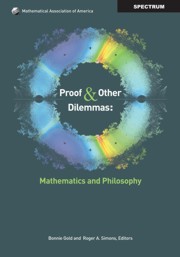Book contents
- Frontmatter
- Contents
- Acknowledgments
- Introduction
- I Proof and How it is Changing
- II Social Constructivist Views of Mathematics
- 4 When Is a Problem Solved?
- 5 Mathematical Practice as a Scientific Problem
- 6 Mathematical Domains: Social Constructs?
- III The Nature of Mathematical Objects and Mathematical Knowledge
- IV The Nature of Mathematics and its Applications
- Glossary of Common Philosophical Terms
- About the Editors
4 - When Is a Problem Solved?
from II - Social Constructivist Views of Mathematics
- Frontmatter
- Contents
- Acknowledgments
- Introduction
- I Proof and How it is Changing
- II Social Constructivist Views of Mathematics
- 4 When Is a Problem Solved?
- 5 Mathematical Practice as a Scientific Problem
- 6 Mathematical Domains: Social Constructs?
- III The Nature of Mathematical Objects and Mathematical Knowledge
- IV The Nature of Mathematics and its Applications
- Glossary of Common Philosophical Terms
- About the Editors
Summary
From the Editors
The question Philip Davis asks in his chapter, “When is a problem solved?” seems like a natural one to ask, but we have never read a discussion of this elsewhere. It is a good example of why it is important for some people who actually do mathematics to contribute to the philosophy of mathematics. There are questions of interest to mathematicians that do not occur to philosophers, who are motivated largely by the types of questions that occur in other areas of philosophy. This question might never occur to philosophers, because it is really only in mathematics that we appear to get final answers to our questions.
Philip Davis is a Professor Emeritus of Applied Mathematics at Brown University (www.dam.brown.edu/people/facultypage.davis.html). He came to Brown after serving as Chief for Numerical Analysis at the National Bureau of Standards in Washington, D.C. for five years. His fields of research included numerical analysis and approximation theory, in which he wrote many papers and several books, including Interpolation and Approximation (1963), Numerical Integration (with Philip Rabinowitz, 1967), and The Schwarz Function (1974) and Circulant Matrices (1979). He is a prize winning expositor of mathematics, who received the Chauvenet Prize of the Mathematical Association of America in 1963 for “An Historical Profile of the Gamma Function.” Professor Davis has also received the Laster Ford Award in 1982 for “Are there Considences in Mathematics?” and the George Polya Award in 1986 for “What Do I know? A study of Mathmatical Self-Awareness.” In 1997, he won the Communications Award of the Joint Policy Board for the Mathematical Science.
- Type
- Chapter
- Information
- Proof and Other DilemmasMathematics and Philosophy, pp. 81 - 94Publisher: Mathematical Association of AmericaPrint publication year: 2008

